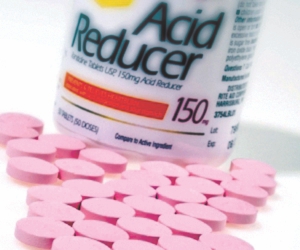Like this article? rabble is reader-supported journalism. Chip in to keep stories like these coming.
After the holidays come the regrets: the bills, the bad news on the scales and, often, an upset stomach that won’t settle down. Doctors see lots of patients complaining about nausea, bloating, cramps and other symptoms of an over-acid digestion system. The most-prescribed remedy these days is a daily pill named Nexium, which is quite expensive. Even the generic substitute costs $75 for 30 days. But there are a few things potential consumers should know.
Let’s start with Mark Hoofnagle’s article, “Why no-one should take Nexium and it should never have been approved.” Hoofnagle, a surgery resident at the University of Maryland, says that Nexium duplicates an existing drug, Prilosec.
“The only active ingredient in Nexium,” he writes, “is the exact same thing as the only active ingredient in omeprazole (Prilosec), a (now) generic drug made by the same company, which is over the counter and four to eight times cheaper. AstraZeneca just figured out how to purify out the active component from omeprazole…” [Emphasis added.] AstraZeneca also advertises aggressively, to doctors and to TV audiences.
Prilosec is much cheaper, usually $10 or $20 instead of $75 for 30 pills. Except I can’t find Prilosec on the drugstore counters. I found earlier antacids, Ranitidine and Famotidine, as generics and under brand names like Zantac. I found Olex, a brand name Prilosec, behind the counter at one pharmacy, hidden away so that customers have to ask for it. And I learned something later confirmed in a call with an 811 nurse.
Pharmacists now play a front-line role in the Alberta health care system. Some medicines are available OTC (over the counter) but only by request, so that the pharmacist can check for other symptoms. “Someone might be in pain from a bleeding ulcer,” the pharmacist explained. I bought one package of 14 pills for $11. There was also paperwork. I had to register to buy Olex.
Prilosec is widely available OTC in the States, and Nexium will be soon too. Here in Canada, Prilosec has been available by prescription since at least the 1990s. In March 2014, Health Canada announced it would allow dose- and quantityt-restricted sales of Prilosec OTC, or from behind the pharmacist’s counter, due to health concerns. Health Canada reports:
“The serious adverse reactions that may be associated with the use of proton pump inhibitors, such as an increased risk of osteoporosis, bone fracture, C. difficile infections and, possibly, hypomagnesaemia and Vitamin B12 deficiency, usually are reported only after long-term (at least one year) daily use and/or with higher daily doses…”
In theory then, despite its risks, Prilosec is supposed to be available at pharmacies. But I tried several pharmacies who had never heard of it. Everybody’s heard of Nexium, though… The name, if not the costs… CanadaDrugs.com offers Losec (brand name Prilosec) at $4.20 a pill, or $420 for 90 tablets. They offer the generic equivalent, Omeprazole, for 82 cents a tablet, or $82 for 100. Some people do take the pills for long stretches of time, regardless of risks.
Of course, there are other remedies for indigestion, starting with eating a healthy diet including yogurt or other probiotics, and managing the discomfort through remedies such as:
- A ban on eating after 9pm, to avoid GERD
- Fennel seeds in tea, plain seeds, and sugar-coated forms
- Heartburn meds containing magnesium and alginic acid (foaming seaweed), such as Gasviscon or its many knock-offs, taken right after or right before eating
- Soluble fibre supplements, like Benefibre, keep bowels regular for almost any diet
- Peppermint tea after dinner and peppermint oil capsules if dyspepsia lasts more than a few days.
(YMMV, as we used to say in the days we paid for email access by the minute… Your mileage may vary.)
Phew! That’s a lot to juggle every day, especially if you have a food allergy or intolerance that adds extra risk to any slip. Hence the pharmaceutical appeal. A little pill in the morning can replace a full day of workarounds.
Putting aside the osteoporosis risks for the moment, I can see why a doctor would feel justified in writing a prescription for an antacid proven to be highly effective. Still, the customer or patient is also justified in asking whether there are other, cheaper options. Prilosec might be easier to get if more doctors prescribed it. On the other hand, if the federal government flexed its bargaining muscle with Big Pharma, patients might get better information, and cheaper prices too.
Like this article? rabble is reader-supported journalism. Chip in to keep stories like these coming.



